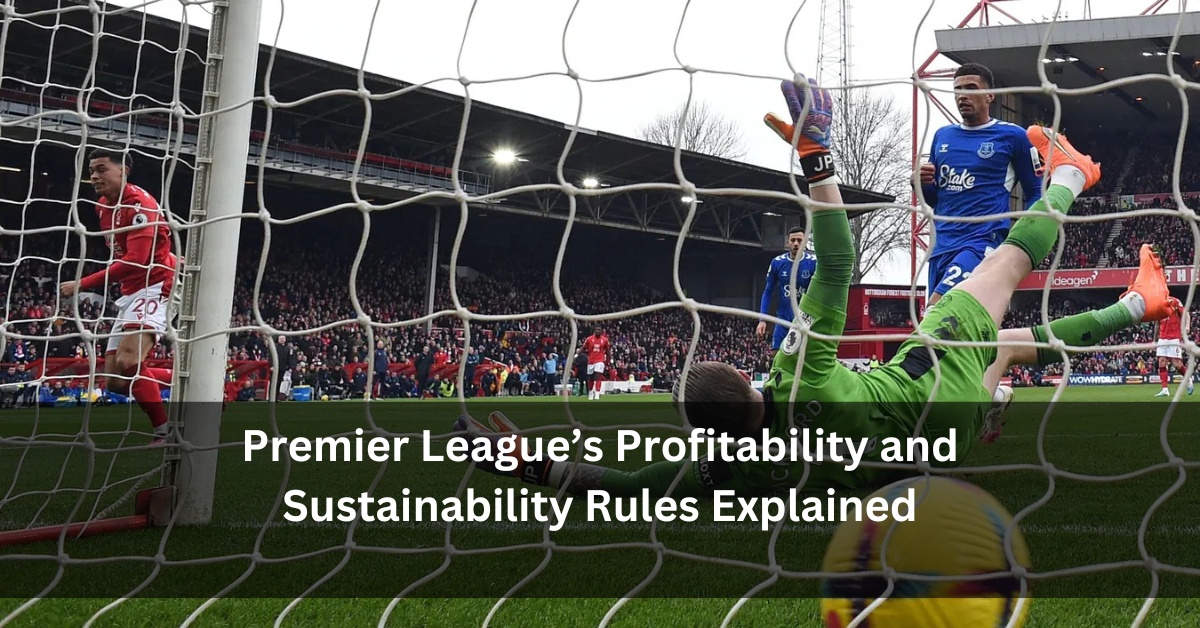Premier League’s Profitability and Sustainability Rules Explained
The Premier League is known for its high-quality football, attracting millions of viewers globally. But behind the scenes, there are strict financial regulations that ensure the league’s stability and fairness. One of the most crucial of these regulations is the Profitability and Sustainability Rules (PSR), introduced to prevent clubs from overspending and ensure they operate within their means. In this article, we’ll break down these rules in simple terms and explain why they matter to both fans and clubs alike.
For more detailed insights, check out the latest updates on the Premier League from Sky Sports.
What Are the Profitability and Sustainability Rules?
The Profitability and Sustainability Rules were introduced in 2013 by the Premier League to promote financial discipline among its clubs. These rules are designed to prevent clubs from making unsustainable financial decisions and accumulating large amounts of debt. Simply put, they aim to ensure that clubs do not spend more than they earn, keeping the league competitive and financially healthy.
For clubs, these rules are an essential part of the financial landscape, as they limit the losses a club can make and ensure that financial practices remain fair and transparent. By enforcing these rules, the Premier League aims to maintain a balance where no club can dominate by simply outspending others.
To understand more about how these rules affect the Premier League, follow Sky Sports for continuous updates.
Key Components of the PSR
1. Loss Limit
The PSR states that clubs in the Premier League can make losses up to £105 million over a three-year period. This loss is calculated based on the club’s income and expenditure during this period. The intention behind this rule is to stop clubs from running into deep financial trouble, which could harm their future stability. If a club exceeds this loss limit, it could face penalties.
2. Owner Investments
In cases where a club exceeds the loss limit, the owners of the club can cover the additional losses through equity investments. This means that owners must invest their own money into the club to cover these losses, not borrow money or take out loans. This requirement ensures that clubs are not excessively reliant on loans, which could create financial instability.
3. Add-backs for Certain Expenses
The Premier League allows clubs to exclude certain expenditures from the loss calculation. For instance, investments in youth development, community outreach programs, and women’s football are excluded from the financial evaluation. These exclusions, referred to as add-backs, help ensure that clubs are encouraged to make long-term investments in their infrastructure and player development, rather than just spending on player acquisitions.
Why Are These Rules Important?
The Profitability and Sustainability Rules are important for several reasons. They help maintain the balance between financial growth and competitive fairness within the Premier League. Here’s why these rules matter:
1. Promoting Fair Competition
One of the primary reasons the PSR exists is to make sure that no club dominates the Premier League by spending beyond its means. While the wealthiest clubs may have more financial resources, these rules prevent them from spending excessively to ensure their dominance. The aim is to create a level playing field where clubs can compete based on their management and performance rather than just their spending power.
2. Ensuring Long-Term Financial Stability
The Premier League’s rules help safeguard the long-term future of its clubs. By limiting the losses a club can make, the PSR ensures that clubs cannot overspend, which could potentially lead to bankruptcy or financial collapse. In the past, football clubs that have gone bankrupt have faced severe consequences, such as points deductions or even relegation. The PSR works to avoid such situations, ensuring that clubs remain financially stable.
3. Encouraging Smart Investments
Instead of focusing on quick, high-risk transfers, the PSR encourages clubs to make investments in areas that will benefit them over the long term. For example, clubs are incentivized to invest in youth development, improving their academies, and expanding their fanbase. This focus on sustainable growth helps improve the league as a whole and ensures that clubs are not just building short-term success but aiming for long-term sustainability.
Consequences of Breaking the PSR
If a Premier League club breaks the Profitability and Sustainability Rules, it could face serious consequences. The league has the authority to impose penalties, including points deductions, fines, or even bans from certain competitions.
For example, Everton FC and Nottingham Forest have been involved in controversies regarding PSR violations. In these cases, the clubs were penalized with points deductions, which impacted their positions in the league. These penalties send a strong message to other clubs about the importance of complying with the PSR and maintaining financial discipline.
Another high-profile case involved Leicester City, which was referred to an independent commission for breaking the PSR. The club reported losses that far exceeded the allowed threshold, making them a prime example of how important it is for clubs to follow these financial rules.
These cases highlight the serious nature of the PSR and their role in ensuring the integrity of the league. Clubs that fail to comply with these regulations not only face financial penalties but also risk damaging their reputation and future prospects.
How Do These Rules Affect Fans?
As a fan, the PSR might not seem like an exciting topic, but it has a significant impact on the football you love. The rules help ensure that the Premier League remains competitive, with all clubs having a fair chance to succeed.
By ensuring that clubs can’t overspend, the PSR prevents a situation where a few wealthy clubs could buy their way to the top, leaving the rest of the teams struggling to compete. This financial equality keeps the league exciting and unpredictable, which is one of the reasons why Premier League football is so thrilling for fans worldwide.
Moreover, the PSR promotes long-term planning, meaning that clubs will invest in building strong academies, developing talent, and ensuring that the football played on the pitch is sustainable for years to come. As a result, the league grows in a way that benefits not only the clubs but also the fans and the broader football ecosystem.
For the latest Premier League updates and more, be sure to visit Sky Sports.
Conclusion
The Profitability and Sustainability Rules of the Premier League are essential for maintaining a fair and financially healthy league. These regulations ensure that clubs do not overspend, promote long-term planning, and ensure that competition remains fair for all teams, regardless of their financial power.
For football fans, this means we get to enjoy an exciting, balanced league with clubs focused on sustainable success. As the Premier League continues to evolve, these rules will play a crucial role in shaping the future of the game.
Stay updated with the latest news and insights from the Premier League by following Sky Sports.
Understanding these rules helps fans appreciate the effort that goes into running a successful club, and how financial health is just as important as the talent on the pitch. The Premier League’s commitment to financial sustainability ensures that the league remains exciting and competitive for years to come. For more news on the Premier League, visit Sky Sports regularly for the latest updates.
As we continue to follow the Premier League, remember that these financial regulations are there to support the growth and sustainability of football – an essential part of the game we all love. Stay informed with Sky Sports, your go-to source for Premier League news and more.







